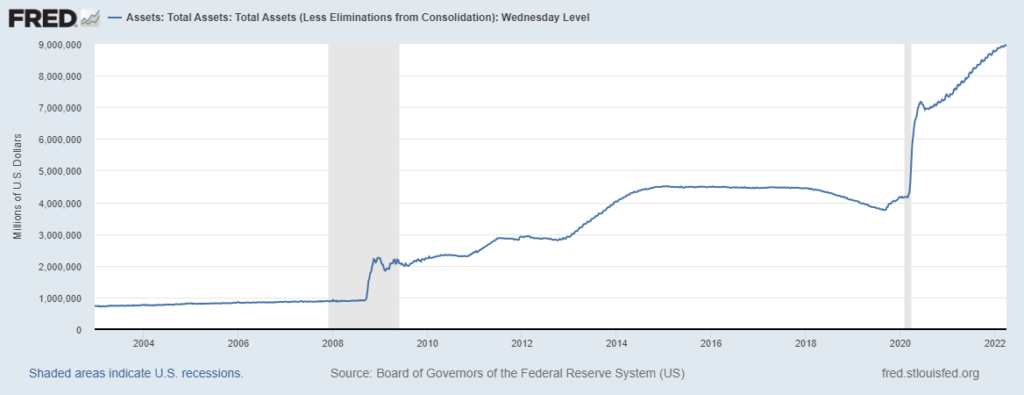It’s been a nasty week in the market, and the cause can be summed up in two words: Federal Reserve.
It’s not always easy to identify “why” stocks move the way they do. So much of the market’s movements appear random at first glance.
But other times — like this week — it’s obvious.
The Fed released the minutes from its last meeting (the one where it decided to implement its first interest rate hike since 2018). And investors were less than happy with the tone.
Two things in particular stood out:
- Several members of the Federal Open Market Committee (the Fed branch that establishes monetary policy) called for a 0.5% rate hike, as opposed to the customary 0.25% that was decided on. And the language suggested one or more 0.5% hikes might be likely this year.
- While the Fed has teased that it plans to gradually reduce its massive $9 trillion balance sheet by either selling bonds or opting not to replace bonds that mature, that vague notion is starting to look more like a concrete plan. The minutes stated: “Participants reaffirmed that the Federal Reserve’s securities holdings should be reduced over time in a predictable manner.”
On that second point, the Fed is expected to approve a plan at its next meeting in May. The plan would reduce its balance sheet by up to $95 billion per month (or $1 trillion per year!), according to Bloomberg.
To give that a little context, the Fed gobbled up close to $5 trillion in bonds since the end of 2019. That’s an injection of liquidity equal to about 22% of the entire U.S. economy!
Fed’s Monetary Injection Visualized
How the Fed Moves Markets
The Fed doesn’t directly buy stocks or force the stock market higher through its policies.
But once the Fed creates liquidity, it doesn’t have a lot of control over where it goes or how it’s used.
Every dollar the Fed dumps into the system to buy bonds is a dollar that is now available to buy something else. That includes everything from a share of Apple stock to a pack of Pokémon cards.
This goes a long way to explaining why the prices of almost all assets have been soaring higher since 2020.
That extra $5 trillion in liquidity — in addition to 0% interest rates — helped fuel a bubble in stocks, bonds, cryptocurrencies, houses … you name it.
Pulling back that liquidity … or even failing to add to it … creates major, hurricane-force headwinds for a bull market that has thrived amid the Fed’s easy policy.
How Do You Trade This?
It’s tempting to sell everything and bury your cash in mason jars in the backyard. But given that inflation is running at an 8% clip, that’s not the best idea either.
The best advice I can give you is to be selective and stay tactical.
This might not be the best time to initiate a long-term, buy-and-hold position in an index fund.
But even the most extreme bear markets have tradeable rallies. And we aren’t in an extreme bear market.
Money & Markets Chief Investment Strategist Adam O’Dell has identified a number of compelling market trends that will help you ride out whatever the Fed throws at us next.
And the stock recommendations behind one of Adam’s highest-conviction mega trends, renewable energy, are on fire right now! Three of Adam’s four picks are up at least 20% since he recommended them on March 4.
And this is just the beginning.
To find out more about the revolutionary tech one company is using to unleash the largest untapped energy source in the world, watch Adam’s “Infinite Energy” presentation now.
And once you join Green Zone Fortunes, Adam’s premium stock research service, you’ll gain access to his model portfolio that is chock full of recommendations in other mega trends like artificial intelligence, genomics and more.
Click here to see how you can join today and prepare your portfolio for anything the Fed throws at us.
To safe profits,
Charles Sizemore
Co-Editor, Green Zone Fortunes
Charles Sizemore is the co-editor of Green Zone Fortunes and specializes in income and retirement topics. He is also a frequent guest on CNBC, Bloomberg and Fox Business.







